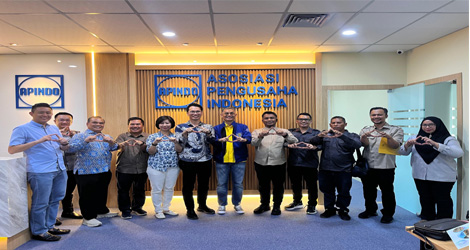APINDO Kaltim Outlines Three Key Pillars for a Just Energy Transition: Infrastructure, Mandates, and Incentives
Saturday, 25 October 2025
Samarinda – The Indonesian Employers Association (APINDO) of East Kalimantan emphasized the importance of three main pillars in ensuring a just and effective energy transition in the region. The message was delivered by M. Reza Fadhillah, Deputy Chair V of APINDO Kaltim, in Samarinda on Saturday (October 25). He underscored that infrastructure, mandates, and incentives are the critical foundations for success.
Reza stated that the business community is fundamentally ready to fully support the government’s direction in transitioning toward cleaner energy. However, he warned that the transition process would face serious challenges if these three pillars were not functioning optimally. East Kalimantan — still heavily reliant on coal and oil and gas — faces significant structural and economic hurdles.
Even so, the private sector in East Kalimantan has already shown commitment by preparing for green jobs and sustainable labor development. This effort is largely driven by international market and investment demands, which now require the adoption of environmentally responsible practices. Such global pressure has become a strong incentive for businesses to adapt and innovate.
Three Key Pillars for a Just Energy Transition
According to Reza, the three pillars — infrastructure, mandates, and incentives — are the core foundation for success.
“If these can work properly, the private sector — meaning us — will definitely follow and comply,” Reza affirmed.
Private sector compliance, he stressed, is vital to ensure a smooth and equitable shift toward clean energy.
The transition in East Kalimantan comes with unique challenges, given the region’s economic dependence on coal and fossil fuels, which remain major contributors to local revenue and employment. Strengthening these three pillars is therefore essential to mitigate potential economic and social risks during the transition.
Reza further noted that without optimal implementation of these pillars, the energy transition could become a burden for businesses. Thus, the government’s readiness to establish a supportive regulatory and policy framework is highly anticipated to ensure a smooth and sustainable transformation.
Preparing Human Resources for Green Jobs
APINDO Kaltim also highlighted the need to develop competent human resources to support green jobs. The private sector, Reza said, is already backing this initiative, encouraged by global market demands for sustainable practices.
He identified three major skill gaps that must be addressed immediately:
Technical skill gaps – between current workforce capabilities and the demands of green industries, such as operating energy-efficient equipment.
Soft skill gaps – particularly adaptive abilities like critical thinking and a strong willingness to learn, which companies increasingly prioritize.
Curriculum misalignment – between educational programs and current industrial needs, which are still modeled on outdated industrial systems.
To bridge these gaps, Reza emphasized the importance of comprehensive and practical training programs supported by modern infrastructure and equipment.
“If the training exists but the tools are inadequate, then it’s pointless,” he said.
Transforming East Kalimantan’s Economy Toward Clean Energy
The Head of the East Kalimantan Manpower and Transmigration Office (Disnakertrans), Rozani Erawadi, acknowledged that the region’s labor market is still dominated by fossil-based industries, highlighting the enormous challenge in achieving an economic transformation.
Rozani stated that the provincial government is working intensively to reduce dependence on fossil resources by 2035, in line with the national agenda for sustainable energy transition.
“The government is striving to transform East Kalimantan’s economy to reduce dependence on the fossil sector by 2035,” Rozani said.
This transformation effort aligns with APINDO Kaltim’s vision to build an ecosystem that supports a just and inclusive energy transition. Collaboration between the government, private sector, and educational institutions will be key to ensuring a smooth, fair, and sustainable transition for all communities in East Kalimantan.
Source: merdeka.com








